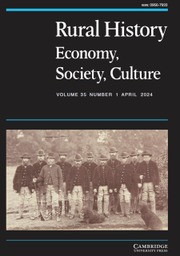Article contents
Interwar France and the Rural Exodus: The National Myth in Peril
Published online by Cambridge University Press: 22 September 2010
Abstract
Interwar France saw itself as a rural nation. The First World War, won in the muddy earth of the trenches, elevated the image of the ‘peasant soldier’ to a symbolic height. But paradoxically, it was during this period that the urban population overtook the rural. Against this backdrop, references to the noxious consequences of rural migration increased in frequency and virulence. The condemnation of rural migration was part of the celebration of a French national identity rooted in the past, the earth and other key agrarian values, such as thrift, hard work and property ownership. French peasants are perceived to be the last bearers of this value set. In other European countries too, the same ideological debate was at play. In Italy and Germany, in particular, the regimes were faced with a similar dilemma, championing a racially pure, rural, identity rooted in the past, whilst embracing a modernising revolution. Their parallel attempts at aligning these two ideas are richly suggestive.
- Type
- Research Article
- Information
- Copyright
- Copyright © Cambridge University Press 2010
References
- 1
- Cited by


